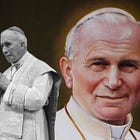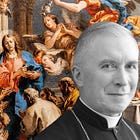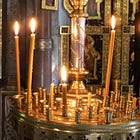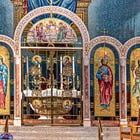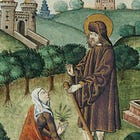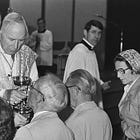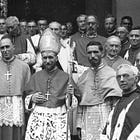Archbishop Lefebvre: 'Who is this man on the throne of Peter?'
On Easter Sunday 1986, Archbishop Marcel Lefebvre delivered a wide-ranging sermon about the Resurrection, the Four Last Things, Assisi, inter-religious services, heretics, and the papacy.
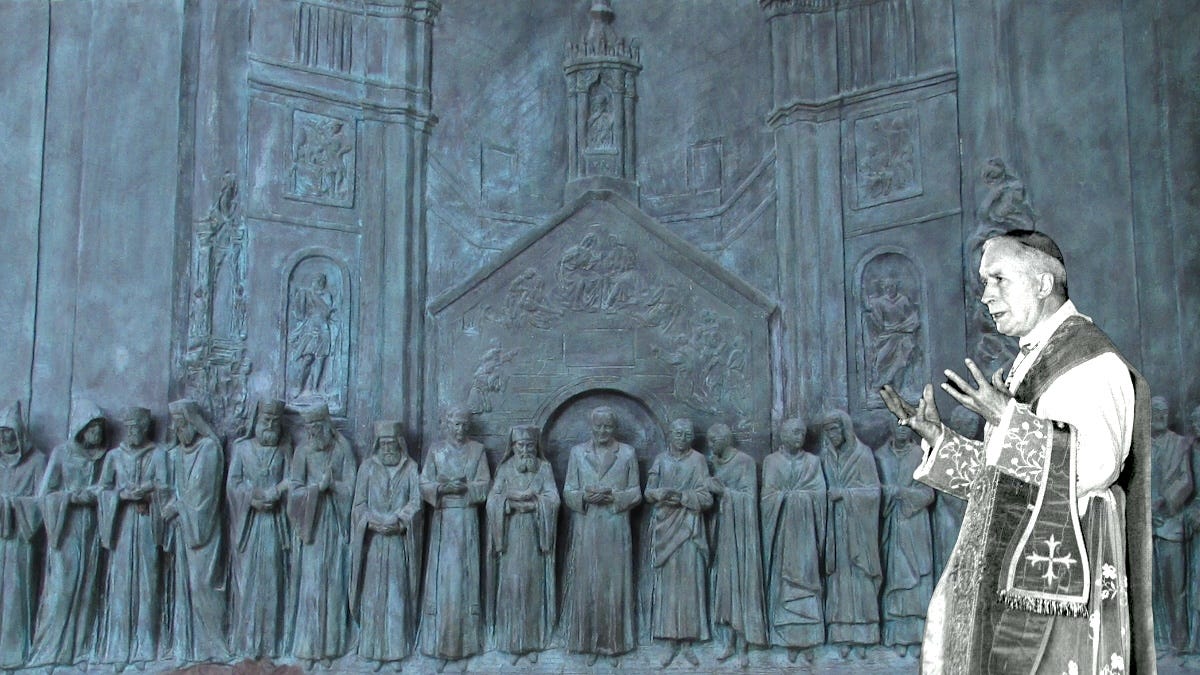
Editors’ Notes
In 1986, during a spiritual conference after Easter, Archbishop Marcel Lefebvre made a striking statement to his listeners.
Some readers will find this statement very surprising indeed.
In fact, it is so striking that it is necessary to provide a significant amount of context first.
After all, whenever someone refers to something that Archbishop Lefebvre said, the first response from those who disagree is normally, “That’s out of context.”
At the time, the Assisi gathering was on the horizon and ecumenism and inter-religious dialogue/services were multiplying. It is evident that this situation – which has only got worse since 1986 – was at the forefront of the Archbishop’s mind.
In the conference in question, he referred to the sermon he had given on Easter Sunday (this present article). He seemed concerned to clarify what he had meant in that sermon.
The Easter sermon itself – which was published with the title ‘Quel est cet Homme sur le Trône de Pierre?’ – referred to that which he had given on Maundy Thursday at the blessing and consecration of the holy oils, a few days prior. Here it is:
In the Easter sermon, he seemed concerned at that Maundy Thursday’s sermon (the previous article) could be misinterpreted by the seminarians to their family and friends when they returned home for the holidays.
Because of this complex lead-up to the conference – and because of their intrinsic interest – we will be providing English translations of these two sermons, before providing that of the conference in question.
In the first sermon of Maundy Thursday, the Archbishop discusses the dispositions needed by seminarians and priests in our day – and no doubt by laymen as well.
In this second sermon (of Easter Sunday), he turns his attention to the infamous Assisi Gathering itself, and examines the Church’s teaching on communicatio in sacris – inter-religious prayer services – and the implications for those who engage in them. Parts of this sermon were incorporated into a more well-known and more tightly-written text, published in the July 1986 edition of The Angelus.
The Archbishop quotes the canonist Naz:
“Those who thus actively and formally participate in the worship of non-Catholics, are presumed to adhere to the beliefs of the latter. That is why Canon 2316 declares them suspected of heresy and if they persist they are considered as actually heretical.”
As a result of this, he presents his listeners with a dramatic conclusion.
“What conclusion will we have to draw, perhaps in a few months, in the face of these repeated acts of communication with false worship? I do not know. I ask myself.
“But it is possible that we will be obliged to believe that this pope is not pope.”
However, many know that the Archbishop considered this drastic conclusion as a possibility, and also as something that the Church might declare in the future.
To be clear, this is not the striking statement to which we are leading – that comes after the Easter holidays, after the seminarians and faculty had the time to reflect on the momentous comments made in this Easter Sermon.
Following his comments on communicatio in sacris, he considers the Four Last Things and the mystery of Easter.
As with the previous sermon, there may be points of phraseology about the current ecclesiastical situation to which we might object, but it remains an important historical text in itself, and useful for providing context for the statement which we shall reach in due course.
‘Who is this Man on the Throne of Peter?’
Easter, 30 March 1986
My dear friends,
My dear brothers,
Before reflecting on this beautiful feast of Easter and the feelings that should animate us on this beautiful day, allow me to complete – especially for you, my dear seminarians, who are about to embark on your holidays shortly – you will meet your parents, your friends, and I would not want what I told you last Thursday during the Chrism Mass to be misinterpreted by you.
The situation in the Church
We know well, my dear brothers, my dear friends, that we are currently facing an increasingly worrying situation in the Church. This problem is not new; it has existed particularly since the council and the implementation of its reforms.
We are witnessing a kind of escalation of ecumenism practised by the pope and the bishops. This is no secret; it is seen and known by everyone: it is presented on television, through all means of social communication. Everyone is well aware of this ecumenism practised today by the Church authorities.
So, this ecumenism poses for us – I am certain of it – dear faithful, dear friends, a grave problem of conscience. For us, we think and have decided (and I do not think we intend to change): we want to remain Catholic. And for us, Catholicism means: keeping the faith, the sacraments, the Holy Sacrifice of the Mass, the catechism that the Church has taught, has bequeathed, as a precious heritage for nineteen centuries, to generations and generations of Catholics.
We ourselves have received in our childhood, our youth, our adolescence, our mature age, this precious heritage and we are attached to it as to the apple of our eye, thinking that this faith which has been bequeathed to us – and all the means to keep the faith that have been bequeathed to us, to maintain grace in us – are necessary, absolutely indispensable to save our souls, to go to Heaven. It is nothing else we want: to remain Catholics, to save our souls.
So, when I had the occasion to tell you last Thursday, my dear friends, that we feel we are moving ever further away from those who practise this insane ecumenism, contrary to the Catholic faith – I should rather say, that by remaining Catholic and deciding to remain Catholic until the end of our days – it is they whom we see moving away from us, because we remain Catholic and they move ever further away from the profession of this Catholic faith which is the first precept of a baptised person, to profess their faith.
It is not for nothing that our godfather and godmother pronounced the Creed on the day of our baptism – and that we ourselves later – at the confirmation we received, we repeated ourselves, this Creed, which binds us definitively to the Catholic faith.
John Paul II’s ecumenical activities
Now, it is a certain fact, known to everyone, especially since the pope's trip to Morocco, Togo, India and in the communiqués that the Holy See officially issued in recent days, to say that the pope intended to go to the Jews, to pray with them, that the pope intended to go to Taizé to pray with the Protestants and that he intended – he said it himself publicly at St Paul’s Outside-the-Walls – to hold a ceremony that would bring together all the religions of the world to pray with them, in Assisi, for peace on the occasion of the Year of Peace proclaimed by the UN and which for the UN should take place on 24 October.
These are the facts. You read it in the newspapers; you heard it on television, for those who have television.
What do we think? What is the reaction of our Catholic faith? That is what counts, it is not our personal feeling, some kind of impression or observation. It is about knowing what the Catholic Church thinks about it; what has been taught to us; what our faith tells us about these facts.
That is why I allow myself to read to you a few very short words that I have gathered from the Dictionary of Canon Law, by Canon Naz, which is officially the commentary on Canon Law which has been the law of the Church since the earliest times of the Church. The Canon Law edited and published on the order of Pope Pius X and published by Benedict XV, the Canon Law is the expression of the law of the Church that has been followed for nineteen centuries.
What does it say about what is called communicatio in sacris, that is, participation in a Catholic worship, participation in a Catholic worship among non-Catholics? I believe this is indeed what concerns us; this is indeed what we see: the participation of the pope and bishops in non-Catholic worship.
What does the Church say about it?
Communicatio in sacris, as the Church says in Latin: It is forbidden with non-Catholics by Canon 1258, paragraph 1, which says:
“It is absolutely forbidden for the faithful to attend or actively participate in the worship of non-Catholics in any way whatsoever.”
And here is how he explains it (and I am only copying what is found in the official commentary of the doctrine of the Church):
"Participation is active and formal when a Catholic participates in heterodox worship, that is to say, non-Catholic, with the intention of honouring God by this means, in the manner of non-Catholics."
I repeat… [The Archbishop re-reads the paragraph].
This is exactly what we are facing. I truly think that the bishops and the pope intend to honour God, through the non-Catholic worship in which they participate. I do not think I am mistaken.
"Such participation is forbidden, in any form – quo vis modo – because it implies the profession of a false religion and consequently the denial of the Catholic faith.
“It is not permitted to pray, to sing, or to play the organ in a heretical or schismatic temple by associating with the faithful who celebrate their worship, even if the terms of the chant and the prayers are orthodox."
It is not I who wrote this. It is written in full in the Dictionary of Canon Law by Canon Naz, which is an official piece, which has always been considered in the Church as a completely official and valid commentary.
"Those who thus actively and formally participate in the worship of non-Catholics, are presumed to adhere to the beliefs of the latter. That is why Canon 2316 declares them suspected of heresy and if they persist they are considered as actually heretical."
It is not I who says it, once again. Why this legislation of the Church? To help us practice the first commandment that we have of professing our Catholic faith.
The impossibility of communication in sacris and inter-religious prayer
If we profess our Catholic faith, it is impossible, inconceivable to profess another faith, another worship. Because in praying in another worship we profess to honour the god invoked by this worship, by the worship of a false religion, a false religion. It is to honour a false god; a god who is a construction of the mind or who is some idol, but who is not the true God.
How do you expect the Jews to pray to the true God? They are formally, essentially against Our Lord Jesus Christ, ever since the Resurrection of Our Lord. And even before, since they crucified him. But in an almost official way, after the Resurrection of Our Lord. And they immediately began to persecute the disciples of Our Lord, and this for centuries. How can we pray to the true God with the Jews?
Who is Our Lord? The Word of God. He is God. We have only one God: God the Father, the Son, and the Holy Spirit, and only one Lord: Our Lord Jesus Christ.
The evangelists remind us of this ad nauseam. If one opposes Our Lord Jesus Christ, as Saint John explicitly says in his letters:
"Whoever does not have the Son does not have the Father. He who does not honour the Son does not honour the Father."
This is normal, there is only one God in three Persons. If one of the Persons is dishonoured, is refused, it is impossible to honour the other Persons. It is destroying the Holy Trinity. Therefore, by dishonouring Our Lord Jesus Christ, the Jews dishonour the Holy Trinity. How can they pray to the true God? There is no other God in Heaven, that we know of, who has been taught to us by our Catholic faith.
The wider implications of the situation
This is the situation we are faced with. I do not invent it. It is not what I want; I would want to die so that this situation does not exist. I would like to give my life. But we are faced with this situation. How do we judge it according to our faith, according to the doctrine of the Church? We are faced with a grave, excessively grave dilemma, which I believe has never existed in the Church: That he who sits on the chair of Peter participates in the worship of false gods. I do not think this has ever happened in the History of the Church.
What conclusion will we have to draw, perhaps in a few months, in the face of these repeated acts of communication with false worship? I do not know. I ask myself.
But it is possible that we will be obliged to believe that this pope is not pope.
For it seems at first glance – I do not yet want to say it in a solemn and formal manner – but it seems at first glance – that it is impossible for a pope to be publicly and formally heretical. Our Lord promised (the successor of Peter) to be with him, to keep his faith, to keep him in the faith. How can he to whom Our Lord has promised to keep in the faith definitively and without error in faith, be publicly heretical and almost apostatize at the same time?
The situation of traditional Catholics
Here is a problem that concerns us all, not just me alone.
If we have been persecuted, if now we are treated as people who are almost outside the Church, why? Because we have remained Catholic. And then we observe that by remaining Catholic, these people move further and further away from Catholic doctrine and consequently move away from us.
What can we do about it? It is absolutely like the Jews moved away from Our Lord. They moved further and further away, until they became sworn enemies of Our Lord Jesus Christ. Whereas they should all have united with Our Lord; whereas they should all have followed the Blessed Virgin Mary and the apostles – with the exception of Judas of course – but all the disciples of Our Lord, Jews, who converted to Our Lord and who followed Our Lord. Our Christian religion started with Jews, converted Jews.
Why are there a certain number who refused to convert despite all the evidence of Our Lord's miracles, the evidence of his Resurrection? Since the soldiers who were present ran, frightened, after the appearance of the angel and the earthquakes that had occurred, they went to see the chief priests to say what had happened. That is to say, that Our Lord was no longer there; that he had risen; that there was nothing left in the tomb and that they had heard a frightening earthquake. They came to bring their observations, their testimony.
What did the chief priests say? Instead of saying…
“Ah, indeed, we make amends; we were wrong; we adore Our Lord Jesus Christ if he is risen. How can we not adore him? How can we not follow him?”
No, what did they say to the soldiers?
“Here is a large sum of money and go tell all Jerusalem that while you were sleeping, the apostles came and took the Body of Our Lord.”
So, as Saint Augustine says very well, smiling I think, he says: But how could they say that the apostles took the Body of Our Lord Jesus Christ, how did they see them since they were sleeping? They could not see. They even said that while they were sleeping the apostles came and took the Body of Our Lord, so they did not see them.
Lie, lie, lie. It is the devil who inspired them; they remained under the influence of the devil.
What are the options before us
What to do, my dear brothers, my dear friends? Pray. Faced with this situation of the Church, we should pray morning and evening, day and night, pray to the Blessed Virgin Mary to come to the aid of her Church.
For it is a considerable scandal – in the true sense of the word scandal – scandal means leading to sin. Well, through this scandal of ecumenism, through this scandal of participation in the worship of false religions, Christians lose their faith. Catholics lose their faith; they no longer have faith in the Catholic Church. They no longer believe that there is only one true religion; that there is only one God, the Holy Trinity, and Our Lord Jesus Christ. Faith disappears.
When the example and scandal come from so high, from he who is on the chair of Peter and almost all the bishops… then poor Christians, who are left to themselves; who do not have sufficient Christian formation to maintain their Catholic faith despite everything, or who do not have priests beside them to help them keep this faith, they are completely lost.
Or they lose faith, do not practice, do not pray anymore, or they engage in any sects. So, we must pray a lot, reflect, ask the Good Lord to keep us in the Catholic faith, whatever happens.
Things continue on the same trajectory
These events do not depend on us, once again. It is like a movie playing out before our eyes. Since the council, we see the situation worsening, year by year, always more serious, always more serious. The synod has marked yet another high point – even graver than the others – because they said: We continue, we continue, despite all the difficulties; the council was the work of the Holy Spirit, it was an extraordinary Pentecost, we must continue. Let us continue in the spirit of the council. No restrictions, no reprimands, no return to Tradition.
And we see now that the fact that the synod said: We must continue in the spirit of the council, well we see the steps now accelerating, going even faster. Necessarily, since there were no objections to these twenty years of the spirit of the council put into practice. Now and henceforth, all those who agree with these transformations of the Church say that there is no reason not to continue even faster.
We come to the total destruction of the Church.
Putting it all in the light of Easter and the Resurrection
But I would not want to fail to mention a few reflections on the beautiful feast of Easter that we have and which, precisely, encourages our faith. For you see, the Catholic Church is the only one, ultimately, that speaks to us of the hereafter with certainty.
Oh, how we must thank the Good Lord for having the Catholic faith. Poor souls who do not have the faith and who wander – I would say – in blindness; who think only of the things here below and who, when they think or have the opportunity to think of things to come, of what will be after death, prefer rather to close their eyes, close their ears, not to mention these things, so as not to have to think about them.
Poor people who, in their blindness and attachment to the things of this world, close their eyes to the most beautiful things that await us up there.
Today, our divine offices say, Our Lord has opened the doors of Heaven. But let us look towards Heaven. He opens the doors of Heaven for us, why? But to bring us all there, of course! So that all men follow him. He, since he has opened this door and he is himself THE Door. Ego sum ostium: I am the Door of Heaven.
But let us look at Jesus Christ, let us look at his Resurrection, let us look at all the holy souls who surround him; let us look at all these righteous people of the Old Testament, who will soon ascend with him to Heaven and already form the body of the Elect in Heaven.
What is the future that awaits us?
So what does the Church teach us about this afterlife that awaits us all? This life (on earth) is short, is brief.
The Church tells us that there are four possibilities for souls, four places where they can be placed, three of which are definitive and one provisional.
The definitive places are: Heaven, Limbo, and Hell.
The provisional place is Purgatory.
This is what the Church teaches us. There are no other places. Either it is eternal happiness, immediately acquired, or it is eternal happiness acquired through a more or less prolonged stay in Purgatory to purify our souls of our venial sins, of the pains due to the sins we have committed.
Or it is Limbo for the souls of those who have not personally sinned and who died with original sin, like all those children who die… alas – when we think of all these abortions, all these children are deprived of sanctifying grace, deprived of the eternal happiness of Heaven – they are not unhappy, but they are nonetheless in this incredible deprivation of an ineffable happiness, of which we have no idea here below. That is Limbo.
And then finally Hell.
And Saint Thomas gives a comparison, very modern I would say, because he says: Our souls when they leave our bodies here below will seek their place, like the stars that have been projected into the sky by the Good Lord. Each took its place according to its gravity, according to the laws of gravitation, according to its importance, it took its place. As we would say today for satellites. We launch satellites which, according to their weight, according to their size, according to their speed, take their place in orbit and revolve around the earth.
Well, souls too – in a certain way – will each take their place. In relation to what? In relation to their relationship with Our Lord Jesus Christ.
The questions to ask ourselves
Are we truly faithful to Our Lord Jesus Christ? Do we love him with all our heart? Will we die in this love by saying:
‘I offer my whole life; I offer everything, I offer my sufferings; I offer my death for Our Lord Jesus Christ; to be united to Our Lord Jesus Christ; to repair faults, out of love for Our Lord.’
So, if we truly perform a perfect act of charity before dying, our souls will naturally go to Heaven and place themselves in Heaven according to our degree of charity; more or less close to Our Lord, automatically – the Good Lord will not even have to judge us. It is we ourselves who judge by the charity we have for the Good Lord, for Our Lord, and we will have eternal happiness.
If, on the contrary, we have sins to atone for, it will be Purgatory. And in Purgatory, we can do nothing by ourselves. Let us not forget this, my dear brothers. Let us not forget that in Purgatory, the souls in Purgatory can do nothing for themselves; they cannot merit; they are fixed in what they are, they simply have a time of punishment to expiate. But this time can be shortened by us, by the faithful who are still on earth. We can pray precisely, we must pray for the souls in Purgatory.
Prayer for the Holy Souls
This is a great reason to pray for the souls in Purgatory. Because we, we can merit for them, by our prayers, by our sacrifices; by offering our sacrifices for the souls in Purgatory, for the souls of our parents, of our friends, of all those who suffer in Purgatory. We can alleviate their pains. They can no longer do anything for themselves; they are waiting for the end of this purification, of this Purgatory and they wish that those who are on earth, their friends, their relatives, pray for them to deliver them as quickly as possible from these pains and that they go to join the elect in Heaven.
On the other hand, it is useless to pray for the elect in Heaven; it is useless to pray for those who are in Limbo; it is useless to pray for those who are in Hell, because in these three places, the state is definitive.
But as we do not know, we do not know among our relatives, our friends, those who die, are they in Heaven? Are they in Purgatory, alas are they in Hell? We do not know.
So we must pray for them and the Good Lord uses these prayers for those who can receive the merits of these prayers, if the people for whom we pray are no longer likely to change their state or modify their state.
On the other hand, those who are in Heaven can pray for us. And that is why we must often invoke the saints of Heaven, particularly of course Our Lord, the very Holy Virgin Mary, the most powerful saints, those for whom we have a particular devotion, our patron saint, our patroness saint, to ask them to come to our aid. They can intercede with Our Lord Jesus Christ for us, for our souls; so that we progress in perfection; so that we prepare ourselves for this so important moment, the most important moment of our life which is our death. So that we are ready to go join them up there in eternity.
The importance of simple things
This is what the Holy Church teaches us. At least things are clear, simple, natural, good for us, which encourage us to walk in the path of perfection. And that is why it is so beneficial and I congratulate all those who have already attended the spiritual exercises of Saint Ignatius here, who have made retreats, to meditate on our last ends; to meditate on these magnificent horizons that the Good Lord presents to us on the occasion of his Resurrection.
Everything we know here below is nothing compared to what we will know if the Good Lord welcomes us into his Paradise. It is Saint Paul who says it: There is no proportion between what we are here and what there is in Heaven.
Draw close to Our Lord Jesus Christ who was crucified
So, let us meditate on these things and strive to be welcomed – I would say – by the angels, as the holy women were welcomed.
Do you see the difference between the guardians of Our Lord's tomb and the holy women who came to see Our Lord, the holy angels told them: You, come closer, because we know that you are looking for Jesus Christ who was crucified.
We know it. So come, come see where he was laid.
The women were frightened, the earthquake, the angel coming down from Heaven, shining with light and splendour, they were terrified; they would have fled as well, like the guardians who themselves fled, ran away. No, to them, the angels said: no, we know that you, you are looking for Our Lord Jesus Christ.
May we also hear: We know that you, you are seeking Our Lord Jesus Christ. May our holy guardian angels tell us that when we come to our last moment. When the Good Lord calls us, may we be received like that by the angels and not flee and go with those who are with the Prince of Lies, as those poor soldiers did by going to find the princes of the priests.
Let us ask the very Holy Virgin Mary, to guide us throughout our lives, so that one day we can go share her happiness in Heaven.
In the name of the Father and of the Son and of the Holy Spirit. Amen.
Further Reading
HELP KEEP THE WM REVIEW ONLINE!
As we expand The WM Review we would like to keep providing free articles for everyone. If you have benefitted from our content please do consider supporting us financially.
A subscription from you helps ensure that we can keep writing and sharing free material for all.
Plus, you will get access to our exclusive members-only material!
Thank you!
Follow on Twitter and Telegram:



